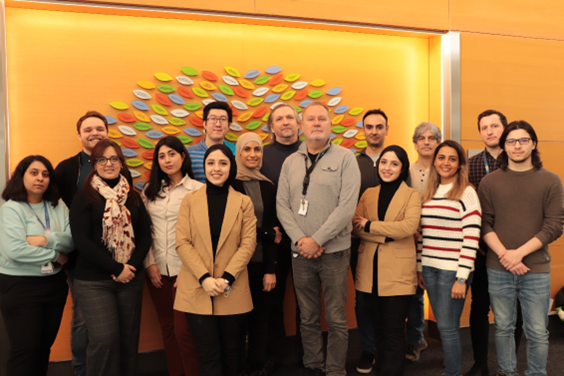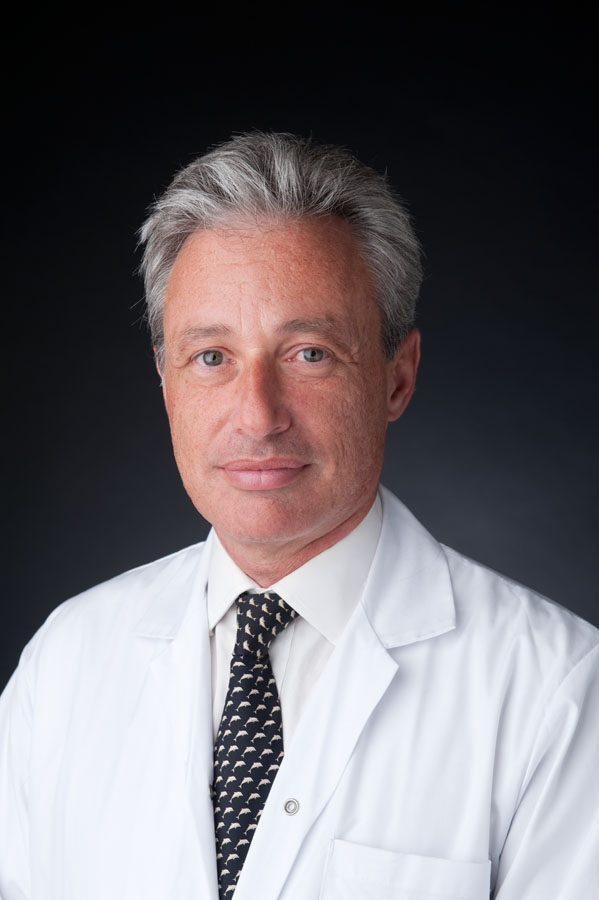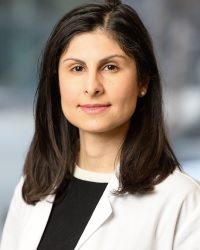Home - Laboratory - Melica N. Brodeur
The Gynecologic Oncology Research Laboratory (GORL) was created in 2003 and is located at the Lady Davis Institute for Medical Research of the Jewish General Hospital in Montreal, Quebec.
Our lab’s overreaching mission is to create a bridge from bedside to laboratory bench, and back from bench to bedside. The purpose of the GORL is to determine important gaps in knowledge and to use basic science and clinical knowledge to address unmet needs. Our objectives include understanding underlying mechanisms of these cancers, identifying their vulnerabilities and their response/resistance to treatment as well discovering promising effective and less toxic novel molecular targeted therapies.
The types of research carried out touch upon the following main themes:
The Jewish General Hospital Gynecologic Cancer Biobank is the result of 20 years of collaborations between patients, clinicians, scientists, and our laboratory. We have a large biorepository (tissue, blood, ascites) of patient samples throughout the course of their treatments.
Our Gynecologic Oncology Biobank is a rich source of biospecimen samples that have helped our research team make important and novel discoveries in the field of gynecologic cancers. This is made possible by the generous donations of patients and their families as well as our generous funding supporters:

The types of research carried out touch upon the following main themes:
Current ongoing projects include:
Lorem ipsum dolor sit amet consectetur adipisicing elit. Maxime mollitia, molestiae quas vel sint commodi repudiandae consequuntur voluptatum laborum numquam blanditiis harum quisquam eius sed odit fugiat iusto fuga praesentium optio, eaque rerum! Provident similique accusantium nemo autem. Veritatis obcaecati tenetur iure eius earum ut molestias architecto voluptate aliquam nihil, eveniet aliquid culpa officia aut! Impedit sit sunt quaerat, odit, tenetur error, harum nesciunt ipsum debitis quas aliquid. Reprehenderit, quia. Quo neque error repudiandae fuga? Ipsa laudantium molestias eos sapiente officiis modi at sunt excepturi expedita sint? Sed quibusdam recusandae alias error harum maxime adipisci amet laborum. Perspiciatis minima nesciunt dolorem! Officiis iure rerum voluptates a cumque velit quibusdam sed amet tempora. Sit laborum ab, eius fugit doloribus tenetur fugiat, temporibus enim commodi iusto libero magni deleniti quod quam consequuntur!

After graduating with a BSc in Biology from Nebraska Wesleyan University, Koren Mann obtained a PhD in Pathology/Immunology from Boston University School of Medicine. Following that, she completed a Postdoctoral Fellowship in Oncology at McGill, where she investigated the use of arsenic as a potential chemotherapy in cancer treatment. Today, she is the Chair of the Department of Pharmacology and Therapeutics, an Associate Member of the Department of Medicine, and a Senior Investigator at the Lady Davis Institute for Medical Research.

After graduating with a BSc in Biology from Nebraska Wesleyan University, Koren Mann obtained a PhD in Pathology/Immunology from Boston University School of Medicine. Following that, she completed a Postdoctoral Fellowship in Oncology at McGill, where she investigated the use of arsenic as a potential chemotherapy in cancer treatment. Today, she is the Chair of the Department of Pharmacology and Therapeutics, an Associate Member of the Department of Medicine, and a Senior Investigator at the Lady Davis Institute for Medical Research.
After graduating with a BSc in Biology from Nebraska Wesleyan University, Koren Mann obtained a PhD in Pathology/Immunology from Boston University School of Medicine. Following that, she completed a Postdoctoral Fellowship in Oncology at McGill, where she investigated the use of arsenic as a potential chemotherapy in cancer treatment. Today, she is the Chair of the Department of Pharmacology and Therapeutics, an Associate Member of the Department of Medicine, and a Senior Investigator at the Lady Davis Institute for Medical Research.
After graduating with a BSc in Biology from Nebraska Wesleyan University, Koren Mann obtained a PhD in Pathology/Immunology from Boston University School of Medicine. Following that, she completed a Postdoctoral Fellowship in Oncology at McGill, where she investigated the use of arsenic as a potential chemotherapy in cancer treatment. Today, she is the Chair of the Department of Pharmacology and Therapeutics, an Associate Member of the Department of Medicine, and a Senior Investigator at the Lady Davis Institute for Medical Research.
Mitra is a research associate in the Mann Lab. After finishing her BSc in Physiology at McGill, she began her career at the Lady Davis Institute. Her project explores the role of copper, a metal commonly found in drinking water, in the progression of amyotrophic lateral sclerosis.
Braeden is a PhD candidate in the Department of Pharmacology. He completed an Honours Bachelor of Science at Queen’s University with a specialization in Drug Development and Human Toxicology. His project focuses on elucidating the consequences of organophosphate esters exposure on macrophage function.
Nivetha is a PhD candidate in the Department of Experimental Medicine. She completed her BSc in Biochemistry at Concordia University. Her project focuses on how a co-exposure to metals, such as arsenic and cadmium, affects the progression of atherosclerosis.
Madelyn is a PhD student in the department of Experimental Medicine. She uses mouse modelling to study Diffuse Large B Cell Lymphoma. In particular, she has found that mutations in the transcription factor STAT6 are enriched at disease relapse, and I study how this contributes to remodeling of the tumour microenvironment.
Rowa is a PhD candidate in the department of Experimental Medicine. She completed her BSc in Microbiology and Immunology in Saudi Arabia, then completed two MScs in Genetics and Parasitology at McGill University. Her work investigates tungsten toxicity focusing on SLC2A2 as a transporter and the effects on mature B lymphocytes.
Vincenza is an MSc. Student in the Department of Pharmacology. She completed her BSc. in Pharmacology at McGill University. Her project aims to elucidate the role of e-cigarette use on the murine cardiopulmonary system. Specifically, she is focusing on metal deposition in the lungs, and the progression of atherosclerosis due to these exposures.
Nazli Zengin is an MSc. student in the Department of Pharmacology. She has a background in pharmacology and environment. Her work currently focuses on elucidating how sex and diet modulate arsenic toxicity and its immunological and cardiovascular consequences.
Andrew is an MSc. student in the Department of Pharmacology who graduated from the B.Sc. program in Biochemistry at McGill in 2021. He works on a proteomics project centred around Arsenic 3-Methyltransferase and the question about whether it serves an additional function.
Raymond is an MSc. Student in the Department of Pharmacology who completed his BSc. in Environmental Health Sciences from the UNC Chapel Hill as a as a Morehead-Cain Scholar. He received the McCall MacBain Scholarship in 2021. His project studies the mechanism of tungsten on mTORC1, a major regulator of cell growth and proliferation.
Nikola is an incoming MSc Student who completed his undergraduate degree in
Microbiology and Immunology at McGill University. He is currently working on an NSERC
summer project that assesses the functional characterization of macrophages exposed to arsenic using murine bone marrow-derived macrophages.
Roni is a second-year BSc student in Chemistry at McGill. As an undergraduate student, she works on various projects across the lab, but is currently focused elucidating the correlation between nonalcoholic fatty liver disease and vaping.
Dr. Wilson Miller, Lady Davis Institute, Montreal
Dr. Sonia del Rincon, Lady Davis Institute, Montreal
Dr. Carolyn Baglole, RI-MUHC, McGill University, Montreal
Dr. Jun Ding, RI-MUHC, McGill University, Montreal
Dr. Susan Gaskin, Department of Chemical Engineering, McGill University, Montreal
Dr. Bernard Robaire, Department of Pharmacology McGill University, Montreal
Dr. Brandon Pearson, Columbia University, New York
Dr. John Wise, University of Louisville, Kentucky
Dr. Wilson Miller, Lady Davis Institute, Montreal
Dr. Sonia del Rincon, Lady Davis Institute, Montreal
Dr. Carolyn Baglole, RI-MUHC, McGill University, Montreal
Dr. Jun Ding, RI-MUHC, McGill University, Montreal
Dr. Susan Gaskin, Dep’t of Chemical Engineering, McGill University, Montreal
Dr. Bernard Robaire, Dep’t of Pharmacology McGill University, Montreal
Dr. Brandon Pearson, Columbia University, New York
Dr. John Wise, University of Louisville, Kentucky
Lorem ipsum dolor sit amet consectetur adipisicing elit. Maxime mollitia, molestiae quas vel sint commodi repudiandae consequuntur voluptatum laborum numquam blanditiis harum quisquam eius sed odit fugiat iusto fuga praesentium optio, eaque rerum! Provident similique accusantium nemo autem. Veritatis obcaecati tenetur iure eius earum ut molestias architecto voluptate aliquam nihil, eveniet aliquid culpa officia aut! Impedit sit sunt quaerat, odit, tenetur error, harum nesciunt ipsum debitis quas aliquid. Reprehenderit, quia. Quo neque error repudiandae fuga? Ipsa laudantium molestias eos sapiente officiis modi at sunt excepturi expedita sint? Sed quibusdam recusandae alias error harum maxime adipisci amet laborum. Perspiciatis minima nesciunt dolorem! Officiis iure rerum voluptates a cumque velit quibusdam sed amet tempora. Sit laborum ab, eius fugit doloribus tenetur fugiat, temporibus enim commodi iusto libero magni deleniti quod quam consequuntur!
Walter Gotlieb:
Melica Brodeur:
Braeden Giles:
Andrew Little:
Nikola Kukolj:
Lorem ipsum dolor sit amet consectetur adipisicing elit. Maxime mollitia, molestiae quas vel sint commodi repudiandae consequuntur voluptatum laborum numquam blanditiis harum quisquam eius sed odit fugiat iusto fuga praesentium optio, eaque rerum! Provident similique accusantium nemo autem. Veritatis obcaecati tenetur iure eius earum ut molestias architecto voluptate aliquam nihil, eveniet aliquid culpa officia aut! Impedit sit sunt quaerat, odit, tenetur error, harum nesciunt ipsum debitis quas aliquid. Reprehenderit, quia.
Dr. Wilson Miller, Lady Davis Institute, Montreal
Dr. Sonia del Rincon, Lady Davis Institute, Montreal
Dr. Carolyn Baglole, RI-MUHC, McGill University, Montreal
Dr. Jun Ding, RI-MUHC, McGill University, Montreal
Dr. Susan Gaskin, Dep’t of Chemical Engineering, McGill University, Montreal
Dr. Bernard Robaire, Dep’t of Pharmacology McGill University, Montreal
Dr. Brandon Pearson, Columbia University, New York
Dr. John Wise, University of Louisville, Kentucky
Lorem ipsum dolor sit amet consectetur adipisicing elit. Maxime mollitia, molestiae quas vel sint commodi repudiandae consequuntur voluptatum laborum numquam blanditiis harum quisquam eius sed odit fugiat iusto fuga praesentium optio, eaque rerum! Provident similique accusantium nemo autem. Veritatis obcaecati tenetur iure eius earum ut molestias architecto voluptate aliquam nihil, eveniet aliquid culpa officia aut! Impedit sit sunt quaerat, odit, tenetur error, harum nesciunt ipsum debitis quas aliquid. Reprehenderit, quia. Quo neque error repudiandae fuga? Ipsa laudantium molestias eos sapiente officiis modi at sunt excepturi expedita sint? Sed quibusdam recusandae alias error harum maxime adipisci amet laborum. Perspiciatis minima nesciunt dolorem! Officiis iure rerum voluptates a cumque velit quibusdam sed amet tempora. Sit laborum ab, eius fugit doloribus tenetur fugiat, temporibus enim commodi iusto libero magni deleniti quod quam consequuntur!
To help us attain our mission to improve the lives of those affected by gynecologic cancers, we are grateful to the funding support we receive from funding agencies and private donors. With your support, we strive to make clinical meaningful discoveries in the lab to improve patient care.
Special thanks to:
Fonds de Recherche du Québec – Santé
Canadian Institutes of Health Research (CIHR)
Gloria Girls Gloria Shapiro Foundation
Canadian Foundation for Women’s Health
Francine Grzywacz Memorial Fund
Friends for Life Foundation
Garber Fund
Israel Cancer Association
Israel Cancer Research Fund
JGH Foundation
Levy Family Fund
Reseau de recherche sur le cancer
Susan and Jonathan Wener Fund
Visman Fund of Tel Aviv University
Weekend to End Women’s Cancers
3755 Côte Ste-Catherine Road
Montreal, Quebec H3T 1E2
Email:
You have the power to make a difference! Your gift will support vital research at the Lady Davis Institute for Medical Research (LDI) that will translate into disease prevention, improved diagnoses, earlier detection, new and enhanced therapies, a better quality of life, wellness and hope for all of us.
Faire la différence, vous avez ce don! Votre contribution soutiendra la recherche essentielle menée à l’Institut Lady Davis qui permettra la prévention des maladies, des diagnostics plus précis, des dépistages plus rapides, des traitements innovants et plus performants, une meilleure qualité de vie, le bien-être et l’espoir pour nous tous.
Copyright © 2024 | Lady Davis Institute for Medical Research/Jewish General Hospital
Conception et développement : Yankee Media